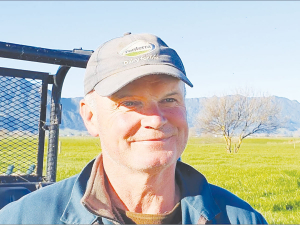Fonterra’s exit from Australia ‘a major event’
Fonterra’s impending exit from the Australian dairy industry is a major event but the story doesn’t change too much for farmers.
 Andrew McGiven believes most shareholders will back Fonterra selling its remaining overseas milk pools.
Andrew McGiven believes most shareholders will back Fonterra selling its remaining overseas milk pools.
Fonterra's plan to return $1 billion to shareholders in three years through the divestments of overseas milk pools is the right move, according to Waikato farmer Andrew McGiven.
While the co-operative has used proceeds from previous divestments to reduce debt, this is the first time it has signalled a return of capital to shareholders.
The co-op didn’t return any capital to shareholders after the sale of its ill-fated China Farms. Over the years, the co-op invested close to $1 billion dollars in the Chinese farms – with little or no returns for farmer shareholders.
McGiven believes that after the experience with China Farms, most shareholders and milk suppliers will back the sale of the remaining overseas milk pools.
Fonterra believes it has an opportunity to differentiate New Zealand milk further on the world stage, with the aim of getting more value from the co-op’s milk.
As a result, it is reviewing ownership its Chilean and Australian businesses where it still collects and processes milk.
McGiven, a former Waikato Federated Farmers president, told Rural News that selling assets and returning most of the proceeds to shareholders is the right thing to do “if those plants pose a risk of becoming a burden on the balance sheet”.
“Since those assets have been paid for over time by the suppliers, then that is where the sales proceeds should go.”
He says focusing on NZ milk is a no-brainer.
“Especially now that we have with a static milk pool and increasing competition for milk from new processors,” he says.
“Fonterra can better monitor the quality of the product and better secure the supply chain so that potential milk contamination issues can’t occur and also better oversee costs.”
Chief executive Miles Hurrell says as the co-op looks out to 2030, the fundamentals of dairy – in particular, New Zealand dairy – look strong.
“Put simply, the world wants what we’ve got – sustainably produced, high-quality, nutritious milk,” he says.
“This comes at a time when we see total milk supply in New Zealand as likely to decline, and flat at best. On one hand, this requires the right capital structure to help ensure we don’t lose the benefits of what generations of farmers have built – a New Zealand dairy cooperative of scale.
“But on the other hand, it gives us more options to be selective about what we do with our coop’s milk. In doing so, we can increase the value we generate for farmers and New Zealand over the next decade.
“To make this happen we have made three strategic choices – continue to focus on New Zealand milk, be a leader in sustainability and be a leader in dairy innovation and science.”
Fonterra also plans to boost its annual R&D investment by over 50% to around $160 million per annum in 2030.
Fonterra’s impending exit from the Australian dairy industry is a major event but the story doesn’t change too much for farmers.
Expect greater collaboration between Massey University’s school of Agriculture and Environment and Ireland’s leading agriculture university, the University College of Dublin (UCD), in the future.
A partnership between Torere Macadamias Ltd and the Riddet Institute aims to unlock value from macadamia nuts while growing the next generation of Māori agribusiness researchers.
A new partnership between Dairy Women’s Network (DWN) and NZAgbiz aims to make evidence-based calf rearing practices accessible to all farm teams.
Despite some trying circumstances recently, the cherry season looks set to emerge on top of things.
Changed logos on shirts otherwise it will be business as usual when Fonterra’s consumer and related businesses are expected to change hands next month.

OPINION: Here w go: the election date is set for November 7 and the politicians are out of the gate…
OPINION: ECan data was released a few days ago showing Canterbury farmers have made “giant strides on environmental performance”.